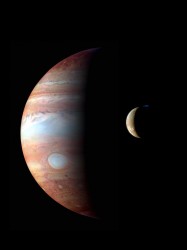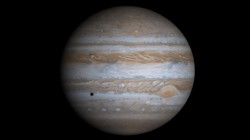No, it’s really massive. The mass of Jupiter is 318 times the mass of the Earth. In fact, Jupiter has 2.5 times the mass of all the other planets in the Solar System combined. But here’s the funny thing…
If Jupiter got any more massive, it would actually get smaller. Additional mass would actually make the planet more dense, and start pulling it in on itself. Astronomers estimate that Jupiter could end up with 4 times its current mass, and still remain about the same size.
2. Jupiter can’t ever become a star
Astronomers call Jupiter a failed star, but that’s not really appropriate. It’s like saying your house is a failed skyscraper. Stars generate their energy through the fusion of mass together. Their enormous gravity creates heat and pressure inside the star so that atoms of hydrogen are fused together to create helium – releasing heat in the process. Jupiter would need more than 70 times its current mass to ignite nuclear fusion. If you could crash dozens of Jupiters together, you might have a chance to make a new star.

3. Jupiter is the fastest spinning planet in the Solar System
For all its size and mass, Jupiter sure moves quickly. In fact, the planet only takes about 10 hours to complete a full rotation on its axis. And because it’s spinning so rapidly, the planet has flattened out a little and is bulging at its equator. In fact, points on Jupiter’s equator are more than 4,600 km further from the center than the poles. This rapid rotation also helps generate Jupiter’s powerful magnetic fields, and contribute to the dangerous radiation surrounding it.
4. The Clouds on Jupiter are only 50 km thick
That’s right, all those beautiful whirling clouds and storms you see on Jupiter are only about 50 km thick. They’re made of ammonia crystals broken up into two different cloud decks. The darker material is thought to be compounds brought up from deeper inside Jupiter, and then change color in sunlight. But below those clouds, it’s just hydrogen and helium, all the way down.
5. The Great Red Spot has been around for a long time
The Great Red Spot on Jupiter is one of its most familiar features. And it looks like the spot has been around for almost 350 years. It was first identified by Giovanni Cassini, who mentioned it back in 1665. A century ago, the Great Red Spot measured 40,000 km across, but it’s shrinking – it’s currently half that size. But astronomers have no idea if and when it’ll ever disappear entirely.
6. Jupiter has rings
The rings around Jupiter were the third set of rings discovered in the Solar System, after Saturn (of course) and Uranus. Jupiter’s rings are fainter than Saturn’s, but they probably come from material ejected by its moons when they’re struck by meteorite impacts.
7. Jupiter’s magnetic field is 14 times as strong as Earth
Compasses would really work on Jupiter. That’s because it has the strongest magnetic field in the Solar System. Astronomers think the magnetic field is generated by the movements of metallic hydrogen deep inside Jupiter. This magnetic field traps ionized particles from the solar wind and accelerates them to nearly the speed of light. These particles create a dangerous belt of radiation around Jupiter that can cause damage to spacecraft.

8. Jupiter has 63 moons
At the time that I’m writing this, Jupiter has a total of 63 named satellites. Almost all of them are less than 10 kilometers in diameter, and were only discovered after 1975, when the first spacecraft arrived at Jupiter. One of its moons, Ganymede, is the largest satellite in the Solar System, measuring 5262 km across.
9. Jupiter has been visited 7 times by spacecraft from Earth
Start counting. Jupiter was first visited by NASA’s Pioneer 10 spacecraft in December 1973, and then Pioneer 11 in December 1974. Then Voyager 1 and 2 in 1979. This was followed by a long break until Ulysses arrived in February 1992. Then Cassini made a flyby in 2000, on its way to Saturn. And finally, NASA’s New Horizons spacecraft made its flyby in 2007. I’m sure these won’t be the last.
10. You can see Jupiter with your own eyes
Jupiter is the third brightest object in the Solar System, after Venus and the Moon. Chances are, you saw Jupiter in the sky, and had no idea that’s what you were seeing. Read Universe Today, and we’ll announce when the best times for seeing Jupiter are. But if you see a really bright star, high in the sky, chances are you’re seeing Jupiter. Get your hands on a pair of binoculars, and if you know someone with a telescope, that’s even better.























